
Vol. 1 no. 4
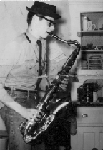 | 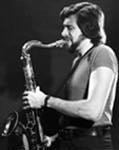 | 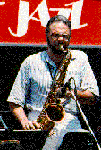 |
 |
AW: When did you start
playing saxophone?
PL: 1952. I was born in 1944, so I was about eight years old. I started on clarinet; my father had a clarinet and other instruments in the house. Pop was an engineer for the state of New York, but he played music and was a part-time musician. We had clarinets, trumpets, pianos, accordions, all of which he learned to play in an orphanage. When Pop was seven, his father died having made arrangements with the Catholic Church to teach both of his sons a trade at the Church orphanage. He went there with his little brother, and his sister stayed at home with their mother. He learned how to become a tailor, and in school he learned piccolo and baritone horn. There was always music all over our house; sheet music, books, etc. I used to see guys come into the house; he taught lessons for 25 cents, 50 cents. He had a little band that worked, a jobbing band. He started me playing clarinet with his band, and we would play ethnic tunes, pop tunes of the day.
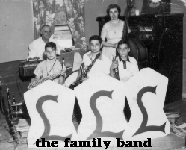 AW: You're the middle
brother?
AW: You're the middle
brother?
PL: I'm the oldest. John's in the middle and Joe is the youngest.
AW: Were you the first one to start playing an instrument?
PL: Yeah. I started playing in 1952 and working in his band in 1953. I would sit next to some of the older saxophone players, playing stuff that he taught me. Then, about a year later, I started playing the alto saxophone, and I played it mostly through the fifties. I got a tenor about 1958. I went into high school in 1959, and got into the high school band playing tenor. We had a concert band and there was a dance band, and meanwhile I was playing gigs with my father on weekends, 5 bucks, 10 bucks, whatever he would pay us. John had started to play piano and trumpet, my father played piano, and my mother would play bass. Mom taught herself the bass by studying finger charts that she taped to the fridge--she would study and cook at the same time when she wasn't working as a registered nurse part-time. Then we formed a family band when Joe started to play drums. We played at clubs and parties.
AW: Was there a lot of music in the house?
PL: Always. It was more swing
oriented, but my father had books of solos by Chu Berry and transcribed Lou
Donaldson solos. I started getting more into jazz in high school because my
high school music teacher had some jazz records; and he knew the guys that
were current. I heard Stan Getz and Lester Young. Prez- that was it! Then I
heard Bird and Miles and Coltrane. Gerry Mulligan was a real big influence
with his pianoless quartet. I started playing baritone for a while.
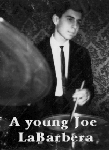 Our
music teacher, Frank Matina, helped me form a little jazz group with my
brothers and friends, Joe Zingarella and Joe Capedonia, and we would play
some tunes as part of the spring and fall concerts. We practiced a lot for
those concerts.
Our
music teacher, Frank Matina, helped me form a little jazz group with my
brothers and friends, Joe Zingarella and Joe Capedonia, and we would play
some tunes as part of the spring and fall concerts. We practiced a lot for
those concerts.
AW: And during this time, were you taking saxophone lessons from anybody?
PL: No. I was just learning to
play on my own; my father had given me lessons, and I would learn from the
books and by ear, taking stuff off the recordings. I'd put the records on
and just try to learn what they were playing. I started to learn about
chords and theory. I started to research what I was hearing. My brothers and
I would read Down Beat and Metronome diligently; sometimes they'd have
harmony lessons in the back, so I'd take the lessons down and learn from
that. We'd listen to Shelly Manne's band all the time.
We had a drummer
friend named Bob Ladelfa, who helped all of us. Prior to our time, he had
owned a club in Mount Morris, and he used to bring in people like Teagarden,
Krupa, and Terry Gibbs. He used to take us to jazz concerts in Rochester and
Buffalo. In Rochester there was a Black social club called Pythod Hall; Jon
Hendrick's brother Jimmy (not the guitarist) owned, or was one of its
owners. They brought in all the black organ trios from New York, Steve
Swallow would come up with different guys, and Pete LaRoca had bands.
I
was accepted by Potsdam College in upstate New York. Prevously they had
allowed only clarinet players into the college. The woodwind teacher seemed
to resent the fact that the school had allowed me in his program, and he
gave me a hard time. He told me to give up music and study something else.
we couldn't play jazz in the practice rooms; we had to go over to the
student union hall to play. At another New York college, Ithaca, they
actually had plaques which read "No playing of jazz" in the
practice rooms. This was 1962! The other students inspured me, though. The
first day I was there I heard a jazz group playing Milestones
I also met (drummer) Hal Miller who became a life-long friend. He
was two years ahead of me, and he got me into listening to some of the
groups I had missed, like Max Roach and Sonny Rollins, and Cannonball
Adderley's group. The program was too restrictive for me, so I returned home
after one semester to work, save some money, and I planned to go to New York
or attend Berklee School of music in Boston. (I hadn't applied there
originally because it was too expensive). So I worked and practiced as much
as I could.
Some friends invited me to travel and share expenses with
them on a trip to Los Angeles in 1963. They wanted to hang out, and I wanted
to hear Shelly Manne and see all the west coast guys I'd been listening to.
I worked all winter and saved my money, and we left in July. We drove out
there, three trumpet players and me in a 1953 Chevy. We had sleeping bags
and would pull over on the side of the road and sleep there or sometimes
we'd pull into parks...
AW: A real adventure!
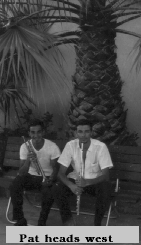
PL: It was...we took about six days, took Route 66, and had a place to stay in Huntington Beach. A relative had a house with a pool and we stayed there. At night we'd go down to the Purple Onion to see Paul Horn; or Shelly Manne, Joe Maini, Joe Gordon, Richie Kamuca at Shelly's Manne Hole. We were out there about a month; I had planned to stay and try to cut into the local jazz scene, but after hearing the level of professional playing in L.A., I decided to go to Berklee for more formal study. I came back home and worked at a canning factory all through the next winter. I got a better paying job in construction and was able to save money for school and was able to buy my first tenor saxophone, a Selmer.
AW: Up until this point, who had you seen of the really big guys?
PL: I saw Coltrane; he used to come to Rochester-he had Roy Haynes on drums at the time-I was totally blown away. I remember Trane coming in and talking to McCoy; it was a hot summer's day so all of the guys would go outside to cool off. He would come off the bandstand, it was the middle of summer, and he had this sweater on, and he would go into the closet where they stored the beer, and would practice his soprano. The other guys were down on the street; there was a big old white upright piano that McCoy had to play. Later on I reminded McCoy about that gig when we worked together, and he remembered that piano! Trane was really popular, and that's what I wanted to do. I was afraid to talk to Trane but I spoke to Jimmy Garrison. You didn't want to talk to Trane, didn't want to bother him. He always looked like he had a mission. The other guys were really approachable.
AW: What about other influences?
PL: Lester Young. I don't know why people don't hear it (in my playing) I guess they can't hear it anymore. I can turn on the Lester Young button and do a real good Prez imitation. Lester Young and Charlie Parker; I studied a lot of Bird when I played alto. Every time I pick up an alto, that's it, I just hear Bird.
AW: Did you come to Parker after Coltrane?
PL: They were almost all at the same time. The samplers I listened to had all the guys: Lester, Bird, Stan Getz with Jimmy Raney. I actually came to Prez by way of Stan Getz. There's a great cut; I Wanna Be Happy with Lester, Nat King Cole and Buddy Rich. I sat there and took that thing off, and then Mulligan Meets Getz was the next big influence on me. Then the west coast guys: Bud Shank, Bill Perkins, Richie Kamuca, and Paul Horn for flute.
Horn made a big impression on me. I had seen a documentary on him when I was in school called A Day in the Life of a Jazz Musician that had inspired me to go to California. Horn had a great band, with Emil Richards on vibes. He patterned his thing after Miles, but with different instrumentation. His mother was Gershwin's rehearsal piano player. He played like Miles on sax and flute. Some 5/4 things too. I did some recordings with him in Toronto, and a couple of years ago, he came out to hear me play in Victoria. I introduced him to the audience and told them that he was one of the reasons I got into jazz.